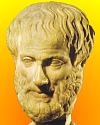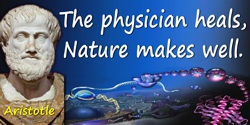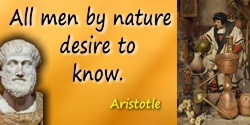
|
Aristotle
(384 B.C. - c. 322 B.C.)
Greek philosopher who presented his thoughts on weather in a book, Meteorologica, which while often wrong, did establish meteorolgy as a distinct discipline for study.
|
Aristotle Quotes on Truth (6 quotes)
>> Click for 111 Science Quotes by Aristotle
>> Click for Aristotle Quotes on | Earth | Nature | Physician |
>> Click for 111 Science Quotes by Aristotle
>> Click for Aristotle Quotes on | Earth | Nature | Physician |
Philosophy is the science which considers truth.
— Aristotle
In Tryon Edwards, A Dictionary of Thoughts (1908), 410.
The investigation of the truth is in one way hard, in another easy. An indication of this is found in the fact that no one is able to attain the truth adequately, while, on the other hand, no one fails entirely, but every one says something true about the nature of things, and while individually they contribute little or nothing to the truth, by the union of all a considerable amount is amassed. Therefore, since the truth seems to be like the proverbial door, which no one can fail to hit, in this way it is easy, but the fact that we can have a whole truth and not the particular part we aim at shows the difficulty of it. Perhaps, as difficulties are of two kinds, the cause of the present difficulty is not in the facts but in us.
— Aristotle
Metaphysics, 993a, 30-993b, 9. In Jonathan Barnes (ed.), The Complete Works of Aristotle (1984), Vol. 2, 1569-70.
To be acceptable as scientific knowledge a truth must be a deduction from other truths.
— Aristotle
Unverified. Webmaster has not yet pinpointed the source in these words. In Astounding Science Fiction (1945), 35, No. 5, it appears as an epigraph, and cites 'Nichomachean Ethics'. This may only be a summary of a theme of Archimedes. Please contact Webmaster if you have a specific reference to the primary source.
Truth is a remarkable thing. We cannot miss knowing some of it. But we cannot know it entirely.
— Aristotle
Free translation of inscription on the building of the National Academy of Sciences, as given as epigraph in Frederick Seitz, The Science Matrix (1998), 1.
We cannot … prove geometrical truths by arithmetic.
— Aristotle
In Posterior Analytics.
We do not know a truth without knowing its cause.
— Aristotle
Nicomachean Ethics, bk. 1, ch. 1.



 In science it often happens that scientists say, 'You know that's a really good argument; my position is mistaken,' and then they would actually change their minds and you never hear that old view from them again. They really do it. It doesn't happen as often as it should, because scientists are human and change is sometimes painful. But it happens every day. I cannot recall the last time something like that happened in politics or religion.
(1987) --
In science it often happens that scientists say, 'You know that's a really good argument; my position is mistaken,' and then they would actually change their minds and you never hear that old view from them again. They really do it. It doesn't happen as often as it should, because scientists are human and change is sometimes painful. But it happens every day. I cannot recall the last time something like that happened in politics or religion.
(1987) -- 


